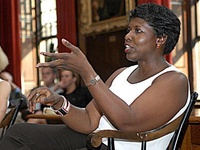
The FleetCenter was in the process of being decorated Wednesday for next week's Democratic National Convention, at which Sen. John F. Kerry, D-Mass., will accept the presidential nomination.
A national poll of college students released by the Institute of Politics (IOP) Wednesday shows that since an initial study in March, nearly one out of every five students surveyed have changed their minds about which presidential candidate they intend to vote for in November.
The study also shows Sen. John F. Kerry, D-Mass., leading President George W. Bush by 20 points among college students—almost double the margin Kerry enjoyed in March.
IOP Research Director David C. King, who was in charge of administering the study, said his intention was to gauge the volatility of the collegiate vote. To do so, King and others at the IOP called back the 1,205 students from a national poll taken by the IOP in March.
With a 95 percent degree of certainty, the study compares the responses of 390 students in July to those they gave in March, King said. He said the demographics of the new and March studies are statistically indistinguishable.
The study finds that 19 percent of the students changed the candidate for whom they intend to vote since March. Nearly 60 percent of those students chose to ally themselves with Kerry. About 20 percent changed to support Bush, and the remaining 20 percent switched their intended vote to independent candidate Ralph Nader.
King, who is also an associate professor at the Kennedy School of Government, said the volatility of the youth vote—which he said is higher than that of the overall voting population—shows that the so-called “undecided” voters who do not identify with a candidate until late in the campaign are not the only votes up for grabs.
“It is the case that people change their minds,” King said.
Most of those surveyed who switched to Kerry objected to some aspect of the war in Iraq, King said.
But Harvard Republican Club (HRC) Secretary Lauren K. Truesdell ’06 said a Wednesday United Press International article that featured unnamed sources claiming three nuclear warheads were found in Tikrit, Iraq, could cause a swing back towards Bush.
“I obviously have no more knowledge of the truth of that [particular] article than anyone else, but if something big happens to justify the war, that will be a big help to Bush,” Truesdell said.
HRC president Mark T. Silvestri ’05 was in Honduras and could not be reached for comment.
The poll, which had a five-point margin of error, also showed Kerry with 55 percent of the student vote, to Bush’s 35 percent. In March, Kerry had 50 percent of the vote and Bush 39 percent.
“What you could legitimately say is [Kerry’s] lead is statistically significantly higher among these students,” King said. “Does it mean it’s actually a 5-point gain for Kerry on top of a 4-point loss for Bush? That’s in question.”
The data show that 44 percent of students who switched their support to Kerry from Bush said their primary reason for the move was a general dislike of Bush.
“Young people I think are not embracing John Kerry. They disdain George Bush,” King said. “This election among college students is more of a referendum of George Bush than moving to John Kerry. That means it is still Bush’s race to win or lose.”
Read more in News
Mahan Unveils New Harvard-Yale Game Plan













